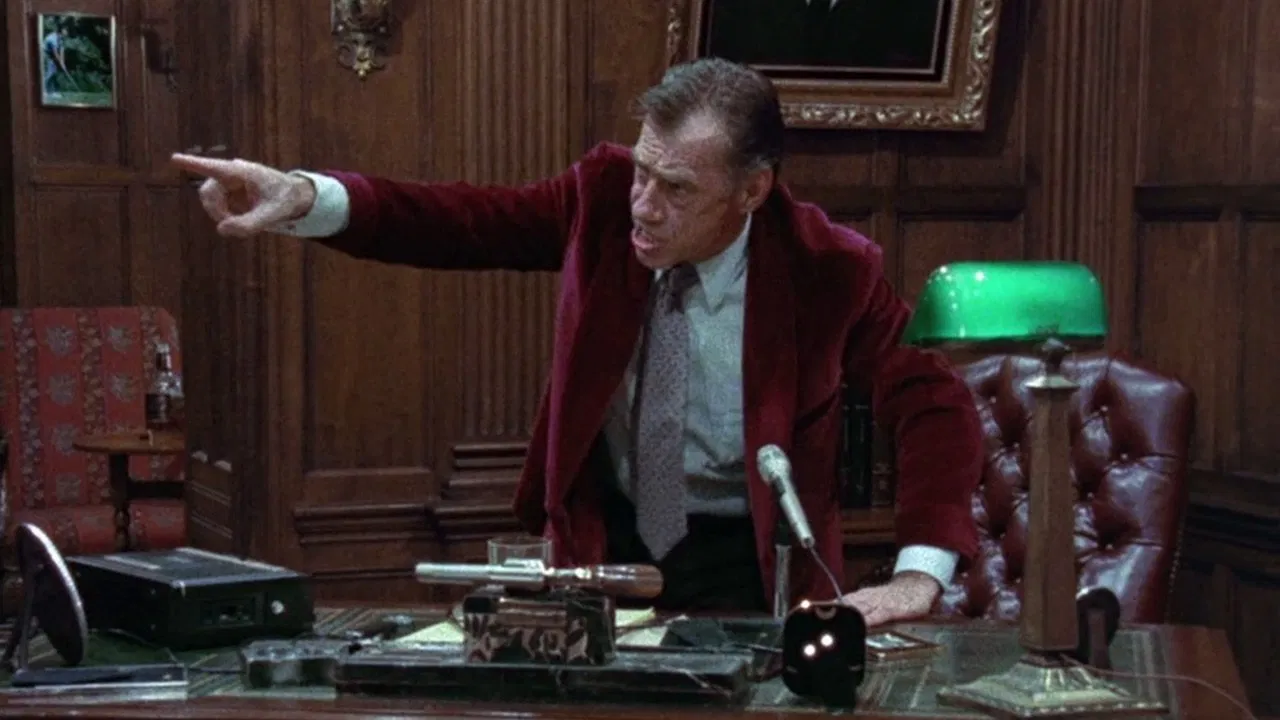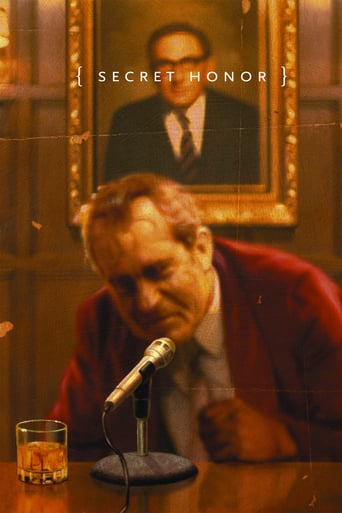Boobirt
Stylish but barely mediocre overall
Smartorhypo
Highly Overrated But Still Good
Phonearl
Good start, but then it gets ruined
Abegail Noëlle
While it is a pity that the story wasn't told with more visual finesse, this is trivial compared to our real-world problems. It takes a good movie to put that into perspective.
tieman64
"You, ladies and gentlemen of the American jury, shall look at the face that is under the mask!" - Philip Baker Hall (Richard Nixon) It takes 12 minutes for Robert Altman's "Secret Honor" to really get going, the audience having to endure some terribly dated TV music and lots of theatrical posturing by Philip Baker Hall, but once the actor begins his meaty monologue, it's hard not to be transfixed.Hall, of course, plays former president Richard Nixon. Recently disgraced by the Watergate fiasco, he prances about his private office with a loaded gun and a glass of whisky, spewing scorn at the Kennedy's, Helen Douglas, Henry Kissinger and a mysterious group called both "The Committee of 100" and "The Bohemian Grove".Employing students from the University of Michigan, and a script that sticks religiously to a stage play by Donald Freed and Arnold Stone, "Secret Honor" is a fairly small scale project for Altman. Still, there are at least four interesting things being done.The first is the film's location. Altman doesn't use his small set with the same gusto that Stone does in "Talk Radio", Hitchcock does in "Rear Window" or Lumet does in "12 Angry Men", but he does add his own little flourishes here and there. For example, Altman surrounds Nixon's room with wall-mounted pictures of past presidents and places a huge bank of security monitors to one side. The effect is such that Nixon, whose monologue takes the form of a courtroom plea of defence, is addressing a jury that is at once himself, we the audience and those political figures he both admirers and detests. There's therefore a sense of profound scrutiny, Nixon waging a war for his own innocence, politicians over his shoulders, a security camera in his face, a national audience behind his back and a bank of monitors recording his every move.The second interesting thing is Hall's performance itself. Unlike Stone's "Nixon" or Ron Howard's "Frost/Nixon", "Secret Honour" is categorically not an attempt to portray some "ultimate truth" of Nixon. Instead, Altman creates something more fragmented; a creature with different faces, facets and feelings. Altman demonizes as he humanises, deconstructs as he constructs, each of Hall's anecdotes serving only to further muddy the water. Altman's Nixon is both raging bull and wounded child, Altman content to create a portrait that is as baffling as it is complex.The third interesting thing is Nixon's insistence that it was a mysterious group of powerful figures who orchestrated and mismanaged his career. He calls them "The Bohemian Grove", a cadre of economic power brokers to whom Nixon is nothing more than a paid lackey and perpetual outsider. Even as he damns them, Nixon mourns that he was never fully accepted by this group. The fourth interesting thing is Nixon's insistence that he staged Watergate deliberately in an attempt to get himself out of office. This claim is filled with ridiculous reversals. The honourable president made himself guilty, he says, committed a deliberately obvious crime, not because he was a paranoid, power hungry mad man, but because he was too noble, too just and great, to associate further with the cartels, criminals and deplorable politicians who were pulling his strings.Watergate thus shifts from becoming a criminal act, to an act of nobility. Nixon, the man so used and abused that he had to sacrifice his own career for the greater good. Poor boy.7.9/10 – This is essentially filmed theatre. Still, Hall delivers a fascinating monologue that is both riveting and demented. Incidentally, Altman pretender Paul Thomas Anderson would use actor Philip Baker Hall extensively throughout his filmography, casting him in "Sydney", "Magnolia" and "Boogie Nights". Worth one viewing.
waywardastronaut
Any comments about this film should be prefaced by a simple, undeniable fact: Despite the genius and talent of Robert Altman, this film succeeds solely on the shoulders of Philip Baker Hall. Sure, he looks and sounds absolutely nothing like Richard Nixon, but any discerning viewer quickly realizes that it doesn't matter. Hall embodies the role, inhabiting every paranoid quirk and arrogant mannerism of our 36th president; and as the film's only star, it's a 90-minute testament to his skill and abilities. (In my opinion, Hall is the most underrated actor in Hollywood today, by far.) With that said, I would much rather see "Secret Honor" as a play, which is how it was originally written. This doesn't mean that Altman's adaptation is bad; on the contrary, it's one of the finest pieces of cinema I've seen in some time, and definitely one of Altman's best. But the director's constant focus on props takes away from any emotional investment we're supposed to feel. Still, I give this 9 stars out of 10--I highly recommend it to anyone interested in different forms of film-making.PS: Anyone who claims this film is politically misguided missed the point entirely--it's not meant to be a political observation or satire, but only a way of understanding. Nixon left us with so many questions and so few answers, this so far is our only way of trying to comprehend...
AdamKey
**May Contain Spoilers**I just finished viewing this incredible, astoundingly intense motion picture for the very first time after hearing about it for 20 years. Philip Baker Hall (who played the character of "Library Cop" on "Seinfeld") essays the part of Richard Nixon in an unforgettable one actor performance. The film had been shot at the Univ. of Michigan, the crew composed largely of UM students, while director Robert Altman was doing a short hitch as filmmaker-in-residence there and has the interesting, "you are there" immediacy and intimacy of a filmed stage play or TV show.The set is a large, wood paneled office, apparently in Nixon's home in San Clemente, a few months after his August 1974 resignation from the Presidency. An angry and restless Nixon nervously paces back and forth with a glass of scotch whiskey in one hand and a loaded revolver lying on his desk, yelling angrily into a running tape recorder about the details of his childhood, adult life, controversial political career, his deep and unhealed resentments and miseries, repeatedly hurling a stream of caustic invective at portraits of Dwight Eisenhower, Jack Kennedy and Henry Kissinger, reserving most of his vitriolic (yet fascinating and perceptive) bile for Kissinger, rarely (typically) blaming himself for his own misdeeds, all the while intermittently and nervously scanning a battery of CCTV monitors whose cameras are already observing and recording him. Nixon on several occasions mentions the mysterious "Bohemian Grove" located in rural northern California (a subject of much "conspiracy theorizing" in recent years.) This film is a must see, if for no other reason to experience Hall's stunning and overwhelming performance as the desperate and doomed Tricky Dick, to appreciate Altman's unique cinematographic and directorial style and to vividly grasp the nature of an bafflingly influential human and cultural "focal point" in recent American history. Additionally, whether one is or isn't a Nixon hater, after finishing this film one may gain some understanding of and deeper insight into if not grudging respect or sympathy for this undoubtedly gifted and highly skilled yet incredibly tormented and angry man whose character, behavior and personality was a rare and corrosive but powerful and unforgettable blend of all of the tragic protagonists that had ever emerged from the works of Shakespeare, Dostoevski and Conrad to Fitzgerald, Beckett and Pirandello.Hall's Richard Nixon, like Marlon Brando's character of Col. Walter Kurtz in 1979's "Apocalypse Now" is a poignant and intense collage of what some might term a classic "American archetype;" a brooding and obsessive "failed overachiever" whose single-minded drive to reach that nebulous yet seductive goal of "being somebody" had been completely and irreparably derailed at the final bend by the same volatile forces that had also driven him relentlessly and vindictively toward that goal, leaving all sorts of tragic wreckage, human and political, in his wake. Was Nixon good, bad, both, neither or something else altogether? And finally, from the opening scene of "Secret Honor," a more specific and pointed question arises, one that persists all the way to the film's final two words: Is there a little bit of Dick Nixon in all of us?
noel-1
Made 11 years before Oliver Stone's "Nixon", with Anthony Hopkins, Robert Altman's direction of Philip Baker Hall in his gritty portrayal of Richard Millhouse on his last night in the Whitehouse, rehashing out all his problems over a bottle of scotch. Fumbling and bumbling around the office with tape machines and casting vague hints into the real motives and players behind the whole debacle. A very watchable and interesting film for anyone interested in Nixon/Watergate. A better film than Oliver Stone's version in spite of a much smaller budget.

